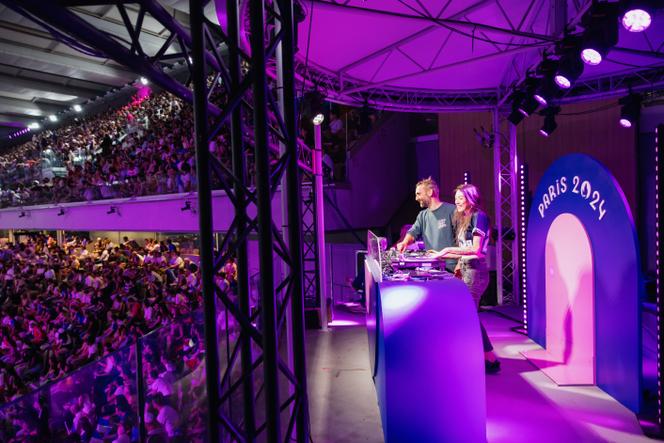


"Damn! We're going to get stuck with Johnny [French rock and pop music idol Johnny Halliday] again! They already did that to us earlier, on Dika Mem's long-range shot. Don't you think DJs tend to encroach on the competition?" On the spectator's stand, one handball aesthete, who was attending their umpteenth match – we didn't dare ask – was fed up with the omnipresent soundtrack, which picked up whenever the match seemed to slow down a little. This took the wind right out of our sails, as we cut short singing Johnny's Que je t'aime, which seemed to have become the new national anthem since the start of the sporting events.
For our incorruptible sports fan, the woman who needed to be stopped was Leslie Dufaux – a heroine for all the others in the crowd who, like us, sang at the top of their lungs. The whole thing was her fault: The lights running across the violet ceilings of the Grand Palais; the "mapping" (a large-scale image projection technique) of Monet's water lilies on the pool of the Paris La Défense Arena; the poles at the rugby matches lighting up, green when a try was scored, red when it was missed. All this carefully crafted scenography, perfected over the last two years – and, of course, the omnipresent music – was down to her and her team.
"Our job is to synchronize people, to channel their energies, to provide a place and a moment to be together," said the head of "sports presentation," as it is known in the Olympic lexicon. This refers to the cocoon of events within which the competition takes place. And, let's face it, you can think yourself intolerant to anthems, pop music and trendy tunes – but they work.
She ran up to us, her hair messy despite being straight, but with a smile on her face. Monday night had been a long one – there had been a dress rehearsal for the closing ceremony at the Stade de France, but for that, they had to wait until the end of the athletics events. That night, however, the jubilation following Armand Duplantis' pole vaulting victory, as he beat his own world record, made the evening drag on. "And then, after the rehearsal, we stayed on forever, because we were happy with what we'd done," she said jokingly. Since then, the work nights have come and gone, each just as sleepless as the first.
Dufaux discovered the world of the Olympics in Turin, Italy, in 2006. Having cut her teeth on production for the TF1 television channel's Star Academy music talent show, she had gone on to work for Eurosport. At the time of that year's Winter Olympics, held in the Italian Alps, the pay TV sports channel was looking to set up an entertainment format and reach out to a more female audience. "It was a geographically complicated city, and a unit was being created. I said to myself: 'This is great, these big events that manage to bring all these people together in a kind of communion. I want that kind of adrenalin!'"
You have 68.15% of this article left to read. The rest is for subscribers only.
